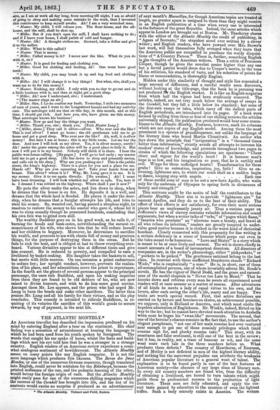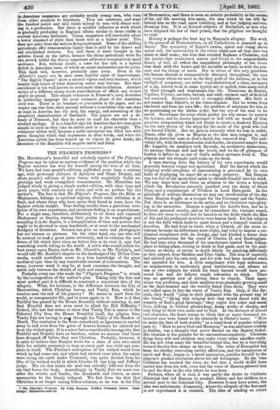THE ATLANTIC MONTHLY.* AN American traveller has described the impression
produced on his mind by entering England after a tour on the continent. His chief feeling was a sensation of astonishment at hearing the language to which he had been used from his youth spoken by foreigners. The words that caught his ear spoke of home, whilst the faces and build- ings which met his eye told him that he was a stranger in a strange country. English readers of an American review experience a some- what analogous sentiment of bewilderment. The Atlantic Monthly seems on many points like any English magazine. It is not the mere language which produces this likeness. The Revue des .Deux Mondes, or one of the numerous German museums, though translated into English, could never be mistaken for the Edinburgh, because the printed sentences of the one, and the pedantic learning of the other, would betray the foreign origin of each. But the Atlantic Monthly might easily pass for one of the numerous shilling magazines which the success of the Cornhill has brought into life, and the list of its contents would excite no surprise if produced as an advertisement
• The Atlantic Monthly. 'Ticknor and Field, Boston.
of next month's Macmillan, for though American topics are treated at length, no greater space is assigned to them than they might receive in an English publication at a time when every one is interested in the fortunes of the great Republic. Indeed, the same articles which appear in London are brought out at Boston. Mr. Thackeray shares with the editor of the Atlantic Monthly the credit of publishing, in " Agnes of Sorrento," the stupidest novel ever written by a clever writer ; and English readers, who have yawned over Mrs. Stowe's last work, will feel themselves fully avenged when they learn that the American public are compelled to purchase the wordy disquisi- tions of" A Country Parson." There is, further, something English in4he thoughts of the American writers. Thus a critic of Fenimore Cooper, though he gives the novelist praise higher than any one but a fervid patriot would deem due to Cooper's merits, in the tone of his criticism, his standard of taste, and his selection of points for blame or commendation, is thoroughly English.
Hidden under this similarity of thought and style lies concealed a large amount of difference, and a careful reader soon discovers, without looking at the title-page, that the book he is perusing was not produced fOr the English market. It is like an English magazine from which half the vigour had been studiously removed. The articles, indeed, are not very much below the average of essays in the Cornhill, but they fall a little below its standard; but none of the first-rate essays or tales, which carry off the dullest parts of English periodicals, are introduced into its pages. If a book were formed by culling from three or four of our shilling reviews the articles universally skipped, the publication produced would bear some resem- blance to the Atlantic Monthly. Features, however, mark its columns which are not copies of any English model. Among these the most prominent is a species of grandiloquence, not unlike the language of the literary lions who bored Martin Chuzzlewit. An author who lays down the principle that "invigoration" is a "thousand times better than information," strictly avoids all attempts to increase his readers' stores of knowledge, and proceeds throughout two pages in strains of which the following ejaculations are specimens : "Cheer cheer and vigour for the world's heart ! It is because man's hope is so low, and his imagination so poor, that he is earthly and evil. Wings for these unfledged hearts ! Transformation for these grubs! Give us animation, inspiration, joy, faith ! Give us en- livening, lightsome airs, to which our souls shall on a sudden begin
to dance, keeping step with angels Each one of these sordid sons of man is he not a new-born Apollo, who waits only for the ambrosia of Olympus to spring forth in divineness of beauty and strength ?"
This sentence might be the motto of half the contributors to the Atlantic Monthly. Their aim is to provide " lightsome airs" for nascent Apollos, and they do so to the best of their ability. The effect of their efforts is not satisfactory, for even their more serious pieces bear an unpleasantly jaunty air. Thus a curious paper on Jefferson's views of slavery contains valuable information and sound arguments, but when a writer talks of "orbs," of "pages which flame," "fanatics who proclaim" an "ulcerous mass a beauty, and brawl at all who refuse its infection," readers are greatly tempted to under- value good matter because it is clothed in the worst kind of rhetorical bombast. Closely connected with this propensity for fine writing is a certain deficiency in a sense of humour which peeps out even in the tales meant to be humorous. "Love and Skates" is a story which is meant to be at once lively and earnest. The wit is shown chiefly in smart accounts of a board of incompetent directors. All directors of companies are, in the writer's phraseology, either "pickpockets," or "pockets to be picked." The gentlemen satirized belong to the last class. In contrast with these inefficient blunderers stands "Richard Wade," who is emphatically "a man." He is, in short, one of those all-accomplished persons, one of whom invariably adorns Mr. Iteade's novels. He has the vigour of David Dodd, and the grace and earnest- ness of the model chaplain in "Never too Late to Mend." That he knocks down and reforms every man he meets all experienced novel readers will at once assume as a matter of course. After adventures of all kinds he meets a lady of equal virtue to his own, and the lovers, after each saving the other's life, marry and are happy. Two traits are worth special record. First, that active flirtations. are carried on by heroes and heroines on skates, an achievement possible, we suppose, only in Holland or America, and which must excite the hopeless admiration of Englishmen. Mr. Winkle, indeed, flirted on his way to the ice; but he cannot have devoted much attention to Arabella when once he began his "swan-like" movements. The second, that one of the heroine's charms consists in the fact that, to use the author's elegant paraphrasis, "not one of her male cousins had ever ventured near enough to get one of those consinly privileges which timid cousins sigh for, and plucky cousins take." This story, with its smartness and false sentiment, is still one of the best in the review; but it has, in reality, not a trace of humour, or wit, and the same want mars each tale in the three numbers before us. What produces these defects ? The country of Hawthorne, of Emerson, and of Motley is not deficient in men of the highest literary ability, and nothing but the narrowest prejudice can attribute the weakness of American popular literature to a general want of talent. The explanation is to be found partly in one of the best .features of American society—the absence of any large class of literary men. In every old country numbers are found who, from the difficulty of obtaining a livelihood, are forced to turn talents which might guide them to professional success to the production of light literature. These men are fully educated, and apply the cor- rect taste gained by education to the creation of even the lightest trifles. Such a body scarcely exists in America. The writers in American magazines are probably mostly young men, who turn from other pursnits to literature. They are amateurs, aud want the finished polish and skill which belong to men with whom writ- ing is a profession. But there is another influence at work which is gradually producing in England effects similar to those visible in current American literature. Cheap magazines will inevitably adopt a lower standard of style than those sold at a higher price. This does not arise from the writers being underpaid. Some of the shilling periodicals offer remuneration higher than is paid by the dearer and old established reviews. Yet, still there is more thought in the articles found in the latter, because the cheap periodicals write for the crowd, whilst the dearer magazines address a comparatively spell audience. But, without doubt,- a taste for fine talk is a special .idefect in American taste, of which no exact explanation can be given. This fault will, however, gradually pass away. Even in the Atlantic's pages can be seen some hopeful signs of improvement. "The Biglow Papers" show a natural vigour and racy humour, which inspire high hopes of what American satire may become. But their excellence is too well known to need more than an allusion. Another writer of a different stamp sends contributions of which any review might be proud. This simple volunteer in Fremont's army describes in soldierlike language the most romantic phase of the American civil war. There is no bombast or pretension in his pages, and no reader can rise from their perusal without a conviction that one man at least in America has the zeal, the energy, and something of the simplicity characteristic of Garibaldi. The papers are not a de- fence of .Fremont, but they do more to exalt his character than a studied apology. It is a hopeful sign for America that her sons grow simple in style as they take an active part in a great struggle. The volunteer writes well, because a noble enterprise has filled him with great thoughts which find expression in dear words, and when the American nation has been braced up to vigour by great deeds, the literature of the Republic will acquire nerve and force.































 Previous page
Previous page